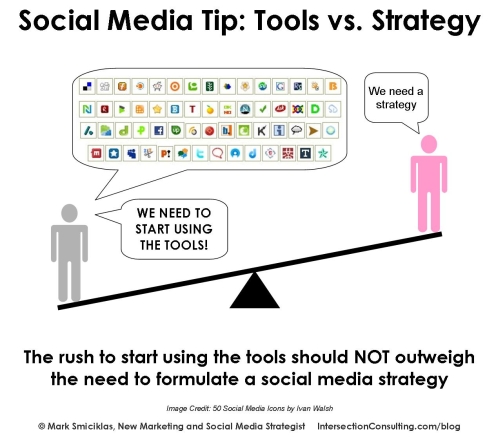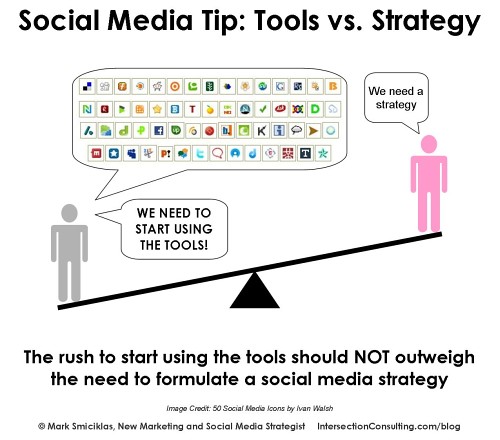 According to the 2010 Social Media Marketing Report , 67% of marketers plan to increase their use of social media channels including blogs, Twitter, and Facebook.
According to the 2010 Social Media Marketing Report , 67% of marketers plan to increase their use of social media channels including blogs, Twitter, and Facebook.
As more companies integrate social media into their marketing and communications plans, emphasis needs to be on creating a social media strategy. Without a strategy, you’ll undoubtedly be sucked into a social media time sink.
So how exactly do you develop this strategy?
It’s easy. Here’s a practical approach to developing a social media strategy for your business.
The Prerequisite
Do you work for a large company? Before you develop your strategy, make sure your upper-management team believes in social media and that the first goal is not to sell, sell, sell. In other words, if your business is jumping into social media because “everyone else is doing it” or because you want to sell product rather than to build relationships, please step away from social media. Social media is a long-term commitment and not a marketing gimmick.
If you’re having a tough time convincing your team that social media needs to be integrated into your marketing plan, then counter any concerns with these responses to common social media objections.
It’s important for the organization to understand that testing and experimentation are keys to success. This comes naturally to an organization whose culture embraces being proactive and open. The reason why all businesses need to have a social media strategy is because it prevents any misunderstandings and emphasizes why social media is relevant to your business’ overall goals.

Here are seven key points to consider…
#1: Determine Your Goals and Objectives
Determine who owns social media. Whether it’s marketing, PR, or communications is irrelevant. In a perfect social media world for businesses, social media instills a collaborative approach and breaks down silos.
What’s important is to understand your social media goals and objectives and how they tie into your overall company goals.
Keep it Specific, Measurable, Attainable, Realistic/Relevant, and Timely (aka be SMART!).
#2: Research, Research, and Research Some More
Rather than jumping into the social media pool with both feet, do the equivalent of the “splash-water-on-self” maneuver so you know what to expect. Step two of creating an effective social media strategy is research.
- Develop a list of social media sites where you can potentially engage with people. The list will most likely start off with Twitter, Facebook, LinkedIn, and a few select blogs and forums.
- Check out each of the social media sites on your list and do additional research to determine relevancy by searching for your brand name, your competitors, and your target keywords. Listen to what’s out there, identify, and understand your target audience.
#3: Create a Digital Rolodex of Contacts and Content
When social media is done correctly, relationships will build naturally. Begin making connections by following the conversation. You can do this by subscribing to blogs in your industry and by making a list of influencers who are relevant to your business.
This becomes handy when it’s time to provide content on your social networks. Read Emily Proctor’s article in which she provides some excellent pointers on a social media content strategy.
Get World-Class Marketing Training — All Year Long!
Are you facing doubt, uncertainty, or overwhelm? The Social Media Marketing Society can help.
Each month, you’ll receive training from trusted marketing experts, covering everything from AI to organic social marketing. When you join, you’ll also get immediate access to:
- A library of 100+ marketing trainings
- A community of like-minded marketers
- Monthly online community meetups
- Relevant news and trends updates
#4: Join the Conversation to Develop Relationships
Now it’s time to start making use of all the research you’ve done. You can start joining the conversation by posting comments on blogs and forums, answering questions on Yahoo! and LinkedIn, joining groups related to your industry and joining Twitter chats.

Discover Proven Marketing Strategies and Tips
Want to go even deeper with your marketing? Check out the Social Media Marketing Podcast! Publishing weekly since 2012, the Social Media Marketing Podcast helps you navigate the constantly changing marketing jungle, with expert interviews from marketing pros.
But don’t let the name fool you. This show is about a lot more than just social media marketing. With over 600 episodes and millions of downloads each year, this show has been a trusted source for marketers for well over a decade.
Begin developing relationships by following and friending influencers and those in your industry. Don’t just look for people with thousands of followers; you’ll be surprised by the value that someone with only a couple of hundred followers provides. Here’s an article on how to network on Twitter.
#5: Strengthen Relationships
It’s easy to hide behind your avatar or profile picture, but face-to-face is incredibly powerful. I think more people are now realizing how underrated the in-person interaction really is because of how far social media has come, allowing so many people to “hide.”
Attend offline events related to your industry—not only to strengthen your knowledge base but also to network and strengthen relationships with those you might have conversed with via social media but never met in person. A popular offline event is known as a tweetup.
#6: Measure Results
You have goals and objectives, right? That means you should be able to measure your success.
Remember, what you measure will tie into the goals and objectives of your social media strategy.
Let’s take the four commonly used objectives:
- Improve brand presence across social channels—The measurement goal here is an increase in the number of followers on Twitter, number of fans on Facebook, number of comments, number of times your brand is mentioned in blogs and forums and so on.
- Increase positive sentiment about your brand—The goal here is to convert the number of positive mentions while taking note of negative mentions. Has the ratio of positive to negative comments improved? With the good comes the bad in social media. Get used to it!
- Develop relationships for future partnership opportunities—This goal is to keep track of those with whom you’ve connected. For example, if you met a potential speaker for your webinar, include that person into your digital Rolodex. If a vendor contacts you through your blog, capture that lead and take note.
- Increase traffic to your website—Keep track of visitors to your website who come from each of your social media sites. If you’re promoting an event using social media, consider using a unique code to track the campaign.
Measuring social media is a never-ending debate. What metrics do you use to measure social media? What objective are you measuring those metrics for?

#7: Analyze, Adapt, and Improve
Your social media strategy doesn’t end with measurement; it goes beyond that. You need to analyze your social media campaigns, adapt any new findings into your current processes, and improve your efforts.
Testing and experimentation will perfect your social media efforts.
As you dive deeper into the never-ending pool of social media, you’ll quickly understand what works and what doesn’t.
More specifically, you’ll develop favorite tools to use, realize that there are certain days and times where it doesn’t pay to be active in social media, and come to the conclusion that you still have lots to learn. It’s a wonderful new world and I hope many of you are as thrilled to be part of it as I am.
Conclusion
Social media strategies will vary for each business and for each industry. However, one thing is clear: social media needs to have “all hands on deck” in order to be successfully integrated into your company’s goals and objectives.
In general, I view social media as a strategy, not a tactic. I consider the social media platforms like blogs, Twitter, Facebook, etc., as tactics that tie into the social media strategy. In other words, outline your social media strategy and support your strategy with tactics. Without a carefully thought-out plan, you’ll eventually be overwhelmed with social media and even worse, get burnt out by it. Use this guide as a stepping-stone to your social media success. Cheers!
What are your thoughts about strategy versus tactics? Do you have any tips from your own experience developing a social media plan? Please share your thoughts in the comments box below.
Image sources:

http://www.flickr.com/photos/cambodia4kidsorg/3290848259/in/photostream/
Attention Agency Owners, Brand Marketers, and Consultants

Introducing the Marketing Agency Show–our newest podcast designed to explore the struggles of agency marketers.
Join show host and agency owner, Brooke Sellas, as she interviews agency marketers and digs deep into their biggest challenges. Explore topics like navigating rough economic times, leveraging AI, service diversification, client acquisition, and much more.
Just pull up your favorite podcast app, search for Marketing Agency Show and start listening. Or click the button below for more information.

